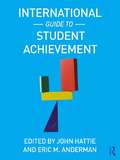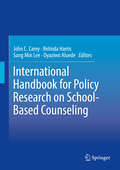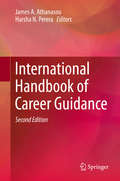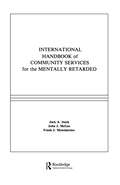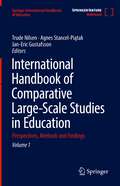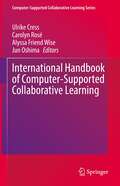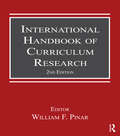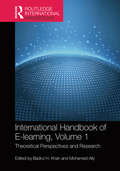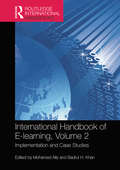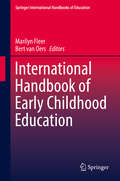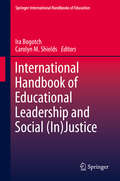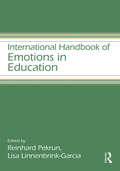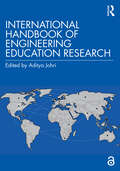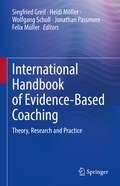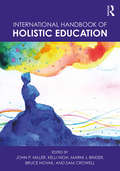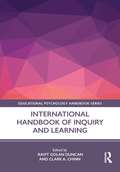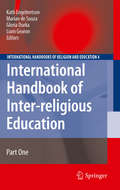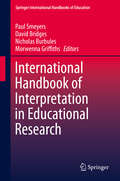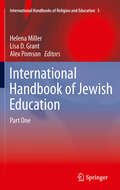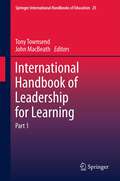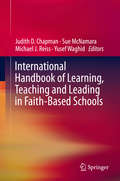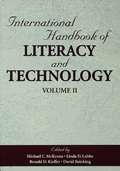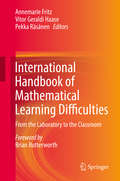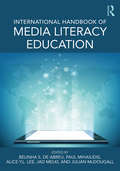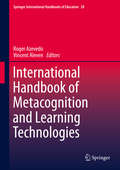- Table View
- List View
International Guide to Student Achievement (Educational Psychology Handbook)
by John Hattie and Eric M. AndermanThe International Guide to Student Achievement brings together and critically examines the major influences shaping student achievement today. There are many, often competing, claims about how to enhance student achievement, raising the questions of "What works?" and "What works best?" World-renowned bestselling authors, John Hattie and Eric M. Anderman have invited an international group of scholars to write brief, empirically-supported articles that examine predictors of academic achievement across a variety of topics and domains. Rather than telling people what to do in their schools and classrooms, this guide simply provides the first-ever compendium of research that summarizes what is known about the major influences shaping students’ academic achievement around the world. Readers can apply this knowledge base to their own school and classroom settings. The 150+ entries serve as intellectual building blocks to creatively mix into new or existing educational arrangements and aim for quick, easy reference. Chapter authors follow a common format that allows readers to more seamlessly compare and contrast information across entries, guiding readers to apply this knowledge to their own classrooms, their curriculums and teaching strategies, and their teacher training programs.
International Handbook for Policy Research on School-Based Counseling
by John C. Carey Belinda Harris Sang Min Lee Oyaziwo AluedeThis handbook examines policy research on school counseling across a wide range of countries and offers guidelines for developing counseling research and practice standards worldwide. It identifies the vital role of counseling in enhancing students' educational performance and general wellbeing, and explores effective methods for conducting policy research, with practical examples. Chapters present the current state of school-based counseling and policy from various countries, focusing on national and regional needs, as well as opportunities for collaboration between advocates and policymakers. By addressing gaps in policy knowledge and counselor training, the Handbook discusses both the diversity of prominent issues and the universality of its major objectives. Topics featured in this handbook include: The use of scoping reviews to document and synthesize current practices in school-based counseling. Contemporary public policy on school-based counseling in Latin America. Policy, capacity building, and school-based counseling in Eastern/Southern Africa. Public policy, policy research, and school counseling in Middle Eastern countries. Policy and policy research on school-based counseling in the United Kingdom. Policy research on school-based counseling in the United States. The International Handbook for Policy Research in School-Based Counseling is a must-have resource for researchers, graduate students, clinicians, and related professionals and practitioners in child and school psychology, educational policy and politics, social work, psychotherapy, and counseling as well as related disciplines.
International Handbook of Career Guidance
by James A. Athanasou Harsha N. PereraThis handbook offers a comprehensive review on career guidance, with an emphasis on the applied aspects of guidance together with research methods and perspectives. It features contributions from more than 30 leading authorities in the field from Asia, Africa, America, Australasia and Europe and draws upon a wide range of career guidance paradigms and theoretical perspectives. This handbook covers such subjects as educational and vocational guidance in a social context, theoretical foundations, educational and vocational guidance in practice, specific target groups, testing and assessment, and evaluation.
International Handbook of Community Services for the Mentally Retarded (School Psychology Series)
by Jack A. Stark, John J. McGee and Frank J. MenolascinoThis handbook provides the reader with the applied knowledge essential for initiating, building, and continuing community service programs for the mentally retarded. Applied to specific populations, and to both urban and rural settings, the model also offers a blueprint for establishing successful service systems.
International Handbook of Comparative Large-Scale Studies in Education: Perspectives, Methods and Findings (Springer International Handbooks of Education)
by Trude Nilsen Jan-Eric Gustafsson Agnes Stancel-PiątakThis handbook is the first of its kind to provide a general and comprehensive overview of virtually every aspect of International Large Scale Assessment (ILSA). It includes historical, economic, and policy perspectives, theoretical foundations, methodology, and reviews of findings from analyses of ILSA data. After decades, during which ILSAs have generated knowledge within central areas of education research and gained increased and substantial impact on educational policy, practice and research, such a broad overview for a wide-ranging audience is much needed. With contributions from authors and editors from all continents, this handbook appeals to an international audience and keeps a neutral perspective, not favoring one ILSA over another.The handbook is suitable to be read by politicians, researchers and stakeholders who are seeking an overview of ILSAs, their history and development, and both potential benefits and limitations with regard to policy implications. The reviews of findings from studies analyzing ILSA data will be of interest to stakeholders, teachers, researchers, and policymakers.Considering that the reviews extend to all fields pertaining to educational research, the book will be valuable to all researchers interested in education. Students may use the book to learn about ILSAs in the context of policy, theoretical underpinnings, or research. Moreover, the methodology section is written in a manner that is understandable and accessible for students, stakeholders, or researchers not familiar with these data. This methodology part, however, is also a valuable resource for researchers who are familiar with ILSA data, as it provides overviews of the design and sampling procedures of several ILSAs, and includes advice on methods of analysis.Even the owners of the ILSAs may find the book valuable, as it contains overviews and insights into a number of ILSAs, provides information how the data is used by the research community, and includes recommendations for future instruments.
International Handbook of Computer-Supported Collaborative Learning (Computer-Supported Collaborative Learning Series #19)
by Ulrike Cress Alyssa Friend Wise Carolyn Rosé Jun OshimaCSCL has in the past 15 years (and often in conjunction with Springer) grown into a thriving and active community. Yet, lacking is a comprehensive CSCL handbook that displays the range of research being done in this area. This handbook will provide an overview of the diverse aspects of the field, allowing newcomers to develop a sense of the entirety of CSCL research and for existing community members to become more deeply aware of work outside their direct area. The handbook will also serve as a ready reference for foundational concepts, methods, and approaches in the field. The chapters are written in such a way that each of them can be used in a stand-alone fashion while also serving as introductory readings in relevant study courses or in teacher education. While some CSCL-relevant topics are addressed in the International Handbook of the Learning Sciences and the International Handbook of Collaborative Learning, these books do not aim to present an integrated and comprehensive view of CSCL. The International Handbook of Computer- Supported Collaborative Learning covers all relevant topics in CSCL, particularly recent developments in the field, such as the rise of computational approaches and learning analytics.
International Handbook of Curriculum Research: Second Edition (Studies in Curriculum Theory Series)
by William F. PinarContinuing its calling to define the field and where it is going, the Second Edition of this landmark handbook brings up to date its comprehensive reportage of scholarly developments and school curriculum initiatives worldwide, providing a panoramic view of the state of curriculum studies globally. Its international scope and currency and range of research and theory reflect and contribute significantly to the ongoing internationalization of curriculum studies and its growth as a field worldwide. Changes in the Second Edition: Five new or updated introductory chapters pose transnational challenges to key questions curriculum research addresses locally. Countries absent in the First Edition are represented: Chile, Colombia, Cypress, Ethiopia, Germany, Iran, Luxembourg, Nigeria, Peru, Poland, Portugal, Singapore, South Africa, Spain, and Switzerland. 39 new or updated chapters on curriculum research in 34 countries highlight curriculum research that is not widely known in North America. This handbook is an indispensable resource for prospective and practicing teachers, for curriculum studies scholars, and for education students around the world.
International Handbook of E-Learning Volume 1: Theoretical Perspectives and Research (Routledge International Handbooks of Education)
by Mohamed Ally Badrul H. KhanThe International Handbook of e-Learning, Volume 1 provides a comprehensive compendium of research and theory in all aspects of e-learning, one of the most significant ongoing global developments in the entire field of education. Covering history, design models, instructional strategies, best practices, competencies, evaluation, assessment, and more, these twenty-seven contributions tackle the tremendous potential and flexibility inherent to this rapidly growing new paradigm. Past and present empirical research frames each chapter, while future research needs are discussed in relation to both confirmed practice and recent changes in the field. The book will be of interest to anyone seeking to create and sustain meaningful, supportive learning environments within today’s anytime, anywhere framework, from teachers, administrators, and policy makers to corporate and government trainers.
International Handbook of E-Learning Volume 2: Implementation and Case Studies (Routledge International Handbooks of Education)
by Mohamed Ally Badrul H. KhanThe International Handbook of e-Learning, Volume 2 provides a comprehensive compendium of implementation and practice in all aspects of e-learning, one of the most significant ongoing global developments in the entire field of education. Covering the integration, challenges, implications, and context-appropriate use of open education networks, blended learning, mobile technologies, social media, and other platforms in a variety of unique international settings, these thirty contributions illustrate the wide-ranging applications and solutions made possible by this rapidly growing new paradigm. Case studies are driven by empirical research and attention to cultural specificity, while future research needs are discussed in relation to both confirmed practice and recent changes in the field. The book will be of interest to anyone seeking to create and sustain meaningful, supportive learning environments within today’s anytime, anywhere framework, from teachers, administrators, and policy makers to corporate and government trainers.
International Handbook of Early Childhood Education
by Marilyn Fleer Bert Van OersThis international handbook gives a comprehensive overview of findings from longstanding and contemporary research, theory, and practices in early childhood education in the Northern and Southern hemispheres. The first volume of the handbook addresses theory, methodology, and the research activities and research needs of particular regions. The second volume examines in detail innovations and longstanding programs, curriculum and assessment, and conceptions and research into child, family and communities. The two volumes of this handbook address the current theory, methodologies and research needs of specific countries and provide insight into existing global similarities in early childhood practices. By paying special attention to what is happening in the larger world contexts, the volumes provide a representative overview of early childhood education practices and research, and redress the current North-South imbalance of published work on the subject.
International Handbook of Educational Leadership and Social (In)Justice
by Ira Bogotch Carolyn M. ShieldsThe International Handbook on Educational Leadership and Social (In)Justice creates a first-of-its-kind international forum on conceptualizing the meanings of social justice and leadership, research approaches in studying social justice and combating social injustices, school, university and teacher leadership for social justice, advocacy and advocates for social justice, socio-cultural representations of social injustices, glocal policies, and leadership development as interventions. The Handbook is as much forward-looking as it is a retrospective review of educational research literatures on social justice from a variety of educational subfields including educational leadership, higher education academic networks, special education, health education, teacher education, professional development, policy analyses, and multicultural education. The Handbook celebrates the promises of social justice while providing the educational leadership research community with concrete, contextualized illustrations on how to address inequities and combat social, political and economic injustices through the processes of education in societies and educational institutions around the world.
International Handbook of Emotions in Education (Educational Psychology Handbook)
by Reinhard Pekrun Lisa Linnenbrink-GarciaFor more than a decade, there has been growing interest and research on the pivotal role of emotions in educational settings. This ground-breaking handbook is the first to highlight this emerging field of research and to describe in detail the ways in which emotions affect learning and instruction in the classroom as well as students’ and teachers’ development and well-being. Informed by research from a number of related fields, the handbook includes four sections. Section I focuses on fundamental principles of emotion, including the interplay among emotion, cognition, and motivation, the regulation of emotion, and emotional intelligence. Section II examines emotions and emotion regulation in classroom settings, addressing specific emotions (enjoyment, interest, curiosity, pride, anxiety, confusion, shame, and boredom) as well as social-emotional learning programs. Section III highlights research on emotions in academic content domains (mathematics, science, and reading/writing), contextual factors (classroom, family, and culture), and teacher emotions. The final section examines the various methodological approaches to studying emotions in educational settings. With work from leading international experts across disciplines, this book synthesizes the latest research on emotions in education.
International Handbook of Engineering Education Research
by Aditya JohriThis comprehensive handbook offers a broad overview of contemporary research on engineering education and its practical application. Over the past two decades, the field of engineering education research (EER) has become a vibrant and impactful community with new journals, conferences, and doctoral and research programs established across the globe. The increased interest in this area has helped improve the education and training of the next generation of engineers, as well as supporting growth in the use of technology for teaching and learning, increased attention to broadening participation, diversity and inclusion in the field, and a wide international expansion of the field. Drawing on the work of 100 expert contributors from over 20 countries, this volume covers both emergent and established areas of research within engineering education, giving voice to newcomers to the field as well as perspectives from established experts. Contents include: Sociocognitive and affective perspectives on engineering education. Technology and online learning in engineering education. Cultural and ethical issues including diversity, equity, and inclusion in engineering education. Curriculum design, teaching practices, and teacher education at all levels. Research methods and assessment in engineering education. This book offers an innovative and in-depth overview of engineering education scholarship and practice, which will be of use to researchers in engineering education, engineering educators and faculty, teacher educators in engineering education or STEM education, and other engineering and STEM-related professional organizations. The Open Access version of this book, available at http://www.taylorfrancis.com, has been made available under a Creative Commons Attribution-Non Commercial-No Derivatives (CC-BY-NC-ND) 4.0 license.
International Handbook of Evidence-Based Coaching: Theory, Research and Practice
by Jonathan Passmore Heidi Möller Wolfgang Scholl Felix Müller Siegfried GreifThis handbook comprehensively covers the fundamental key concepts in coaching research and evidence-based practice and shows how coaching can be applied to multiple contexts. It provides coaching scholars, researchers and practitioners with detailed review of the key concepts, research and new insights into coaching research and practice. This key reference work includes over 70 contributions from more than 110 leading researchers and practitioners in the field across countries, and deftly combines theory with case studies and applications from psychology, sociology, business administration, organizational studies, education, and communication studies. This handbook, edited by the top scholars in the field, is meant for an academic as well as a professional readership, and is an invaluable resource for coaches, clients, coaching institutes and associations, and students of coaching.
International Handbook of Holistic Education
by John P. Miller Marni J. Binder Kelli Nigh Bruce Novak Sam CrowellProviding a comprehensive overview of holistic education’s history, conceptions, practices, and research, this Handbook presents an up-to-date, global picture of the field. Organized in five sections, the Handbook lays out the field’s theoretical and historical foundations; offers examples of holistic education in practice with regard to schools, programs, and pedagogies at all levels; presents research methods used in holistic education; outlines the growing effort among holistic educators to connect holistic teaching and learning with research practice; and examines present trends and future areas of interest in program development, inquiry, and research. This volume is a must-have resource for researchers and practitioners and serves as an essential foundational text for courses in the field.
International Handbook of Inquiry and Learning (Educational Psychology Handbook)
by Clark A. Chinn Ravit Golan DuncanInternational Handbook of Inquiry and Learning is an overview of scholarship related to learning through and engagement in inquiry. Education takes on complex dimensions when learners solve problems, draw conclusions, and create meaning not through memorization or recall but instead through active cognitive, affective, and experiential processes. Drawing from educational psychology and the learning sciences while encompassing key subdisciplines, this rigorous, globally attentive collection offers new insights into what makes learning through inquiry both possible in context and beneficial to outcomes. Supported by foundational theories, key definitions, and empirical evidence, the book’s special focus on effective environments and motivational goals, equity and epistemic agency among learners, and support of teachers sets powerful, multifaceted new research directions in this rich area of study.
International Handbook of Inter-religious Education
by Kath Engebretson Gloria Durka Marian De Souza Liam GearonThis Handbook has the potential to redress the distortion of information about particular religions, to add to understanding about what religions have in common, and to suggest how they can work together for justice and peace. In the present day there is a vital resurgence of interest in religions, with new movements emerging from long established religious traditions. There is also, around the world, a growing sense of the need to preserve indigenous religions, even when these have accommodated to imported traditions. The Handbook gives a voice to this resurgence of interest, and addresses inter-religious education from a range of religious viewpoints and contexts. The publication is very timely especially in light of the need for religions of the world to together contemplate and actively promote human rights, social justice and peace, for religions have a specific mandate for this.
International Handbook of Interpretation in Educational Research
by Paul Smeyers Nicholas C. Burbules David Bridges Morwenna GriffithsThis handbook focuses on the often neglected dimension of interpretation in educational research. It argues that all educational research is in some sense 'interpretive', and that understanding this issue belies some usual dualisms of thought and practice, such as the sharp dichotomy between 'qualitative' and 'quantitative' research. Interpretation extends from the very framing of the research task, through the sources which constitute the data, the process of their recording, representation and analysis, to the way in which the research is finally or provisionally presented. The thesis of the handbook is that interpretation cuts across the fields (both philosophically, organizationally and methodologically). By covering a comprehensive range of research approaches and methodologies, the handbook gives (early career) researchers what they need to know in order to decide what particular methods can offer for various educational research contexts/fields. An extensive overview includes concrete examples of different kinds of research (not limited for example to 'teaching' and 'learning' examples as present in the Anglo-Saxon tradition, but including as well what in the German Continental tradition is labelled 'pädagogisch', examples from child rearing and other contexts of non-formal education) with full description and explanation of why these were chosen in particular circumstances and reflection on the wisdom or otherwise of the choice - combined in each case with consideration of the role of interpretation in the process. The handbook includes examples of a large number of methods traditionally classified as qualitative, interpretive and quantitative used across the area of the study of education. Examples are drawn from across the globe, thus exemplifying the different 'opportunities and constraints' that educational research has to confront in different societies.
International Handbook of Jewish Education
by Alex Pomson Lisa D. Grant Helena MillerThe International Handbook of Jewish Education, a two volume publication, brings together scholars and practitioners engaged in the field of Jewish Education and its cognate fields world-wide. Their submissions make a significant contribution to our knowledge of the field of Jewish Education as we start the second decade of the 21st century. The Handbook is divided broadly into four main sections: Vision and Practice: focusing on issues of philosophy, identity and planning -the big issues of Jewish Education.Teaching and Learning: focusing on areas of curriculum and engagementApplications, focusing on the ways that Jewish Education is transmitted in particular contexts, both formal and informal, for children and adults.Geographical, focusing on historical, demographic, social and other issues that are specific to a region or where an issue or range of issues can be compared and contrasted between two or more locations.This comprehensive collection of articles providing high quality content, constitutes a difinitive statement on the state of Jewish Education world wide, as well as through a wide variety of lenses and contexts. It is written in a style that is accessible to a global community of academics and professionals.
International Handbook of Leadership for Learning
by John Macbeath Tony TownsendThe International Handbook of Leadership for Learning brings together chapters by distinguished authors from thirty-one countries in nine different regions of the world. The handbook contains nine sections that provide regional overviews; a consideration of theoretical and contextual aspects; system and policy approaches that promote leadership for learning with a focus on educating school leaders for learning and the role of the leader in supporting learning. It also considers the challenge of educating current leaders for this new perspective, and how leaders themselves can develop leadership for learning in others and in their organisations, especially in diverse contexts and situations. The final chapter considers what we now know about leadership for learning and looks at ways this might be further improved in the future. The book provides the reader with an understanding of the rich contextual nature of learning in schools and the role of school leaders and leadership development in promoting this. It concludes that the preposition 'for' between the two readily known and understood terms of 'leadership' and 'learning' changes everything as it foregrounds learning and complexifies, rather than simplifies, what that word may mean. Whereas common terms such as 'instructional leadership' reduce learning to 'outcomes', leadership for learning embraces a much wider, developmental view of learning.
International Handbook of Learning, Teaching and Leading in Faith-Based Schools
by Yusef Waghid Judith D. Chapman Sue Mcnamara Michael J. ReissThe International Handbook on Learning, Teaching and Leading in Faith Based Schools is international in scope. It is addressed to policy makers, academics, education professionals and members of the wider community. The book is divided into three sections. (1) The Educational, Historical, Social and Cultural Context, which aims to: Identify the educational, historical, social and cultural bases and contexts for the development of learning, teaching and leadership in faith-based schools across a range of international settings; Consider the current trends, issues and controversies facing the provision and nature of education in faith-based schools; Examine the challenges faced by faith-based schools and their role and responses to current debates concerning science and religion in society and its institutions. (2) The Nature, Aims and Values of Education in Faith-based Schools, which aims to: Identify and explore the distinctive philosophies, characteristics and guiding principles, values, concepts and concerns underpinning learning, teaching and leadership in faith-based schools; Identify and explore ways in which such distinctive philosophies of education challenge and expand different norms and conventions in their surrounding societies and cultures; Examine and explore some of the ways in which different conceptions within and among different religious and faith traditions guide practices in learning, teaching and leadership in various ways. (3) Current Practice and Future Possibilities, which aims to: Provide evidence of current educational practices that might help to inform and shape innovative and successful policies, initiatives and strategies for the development of quality learning, teaching and leadership in faith-based schools; Examine the ways in which the professional learning of teachers and educational leaders in faith- based settings might be articulated and developed; Consider the ways in which coherence and alignment might be achieved between key national priorities in education and the identity, beliefs, and the commitments of faith-based schools; Examine what international experience shows about the place of faith-based schools in culturally rich and diverse communities and the implications of faith-based schooling for societies of the future.
International Handbook of Literacy and Technology: Volume II
by Michael C. McKenna Linda D. Labbo Ronald D. Kieffer David ReinkingThis Handbook provides a comprehensive and international representation of state-of-the art research, theory, and practice related to principal areas in which significant developments are occurring in the study of literacy and technology. It offers a glimpse of the commonalities faced by literacy educators around the world, together with specific challenges raised by unique circumstances.Volume I of this Handbook endeavored to lay essential groundwork for the study of literacy and technology; it retains an explanatory value that will not weaken over time. Volume II differs considerably in conception. It assumes for the most part a higher level of expertise on the part of readers, and the projects and applications described by the contributors are characterized by greater sophistication. The scope of technology use is broader, and the challenges that have emerged are in sharper focus. A powerful feature of this volume is the addition of commentaries from experts across the field on the potential of technology in key dimensions of literacy. The title of Volume II has changed slightly to reflect the inclusion of contributions on a broad geographic basis. It is now a truly international Handbook, with chapter authors from six countries and five continents.The International Handbook of Literacy and Technology: Volume II is organized in five sections:*The Role of Technology in the New Literacies;*Technology Applications with Specific Populations;*Literacy Software and the Internet;*Teacher Education and Professional Development; and*The Potential of Technology in Key Dimensions of Literacy.The effects of technology on literate activity have been both sweeping and subtle, marked by an increasing variety of changes that are difficult to evaluate and project. Perhaps the only prediction that can be offered with certainty is that the impact of technology is irreversible. Specific changes may come and go, but literacy and technology seem inextricably linked. This Handbook is dedicated to that linkage and to examining the intricacies that define it.International Handbook of Literacy and Technology: Volume II is an essential reference for researchers, professionals, and students in reading/literacy education, literacy and technology, educational technology, and related areas, and will serve well as a text for upper-level and graduate courses on these topics.
International Handbook of Mathematical Learning Difficulties: From the Laboratory to the Classroom
by Pekka Räsänen Annemarie Fritz Vitor Geraldi HaaseThis comprehensive volume provides teachers, researchers and education professionals with cutting edge knowledge developed in the last decades by the educational, behavioural and neurosciences, integrating cognitive, developmental and socioeconomic approaches to deal with the problems children face in learning mathematics.The neurocognitive mechanisms and the cognitive processes underlying acquisition of arithmetic abilities and their significance for education have been the subject of intense research in the last few decades, but the most part of this research has been conducted in non-applied settings and there’s still a deep discrepancy between the level of scientific knowledge and its implementation into actual educational settings. Now it’s time to bring the results from the laboratory to the classroom. Apart from bringing the theoretical discussions to educational settings, the volume presents a wide range of methods for early detection of children with risks in mathematics learning and strategies to develop effective interventions based on innovative cognitive test instruments. It also provides insights to translate research knowledge into public policies in order to address socioeconomic issues. And it does so from an international perspective, dedicating a whole section to the cultural diversity of mathematics learning difficulties in different parts of the world. All of this makes the International Handbook of Mathematical Learning Difficulties an essential tool for those involved in the daily struggle to prepare the future generations to succeed in the global knowledge society.
International Handbook of Media Literacy Education
by Paul Mihailidis Belinha S. De Abreu Julian McDougall Alice Y.L. Lee Jad MelkiAt the forefront in its field, this Handbook examines the theoretical, conceptual, pedagogical and methodological development of media literacy education and research around the world. Building on traditional media literacy frameworks in critical analysis, evaluation, and assessment, it incorporates new literacies emerging around connective technologies, mobile platforms, and social networks. A global perspective rather than a Western-centric point of view is explicitly highlighted, with contributors from all continents, to show the empirical research being done at the intersection of media, education, and engagement in daily life. Structured around five themes—Educational Interventions; Safeguarding/Data and Online Privacy; Engagement in Civic Life; Media, Creativity and Production; Digital Media Literacy—the volume as a whole emphasizes the competencies needed to engage in meaningful participation in digital culture.
International Handbook of Metacognition and Learning Technologies
by Vincent Aleven Roger AzevedoIntegrating all aspects of the fields of metacognition and learning technologies, this book describes features of the learning technologies and how they have been designed to study and support metacognitive processing and self-regulated learning.
